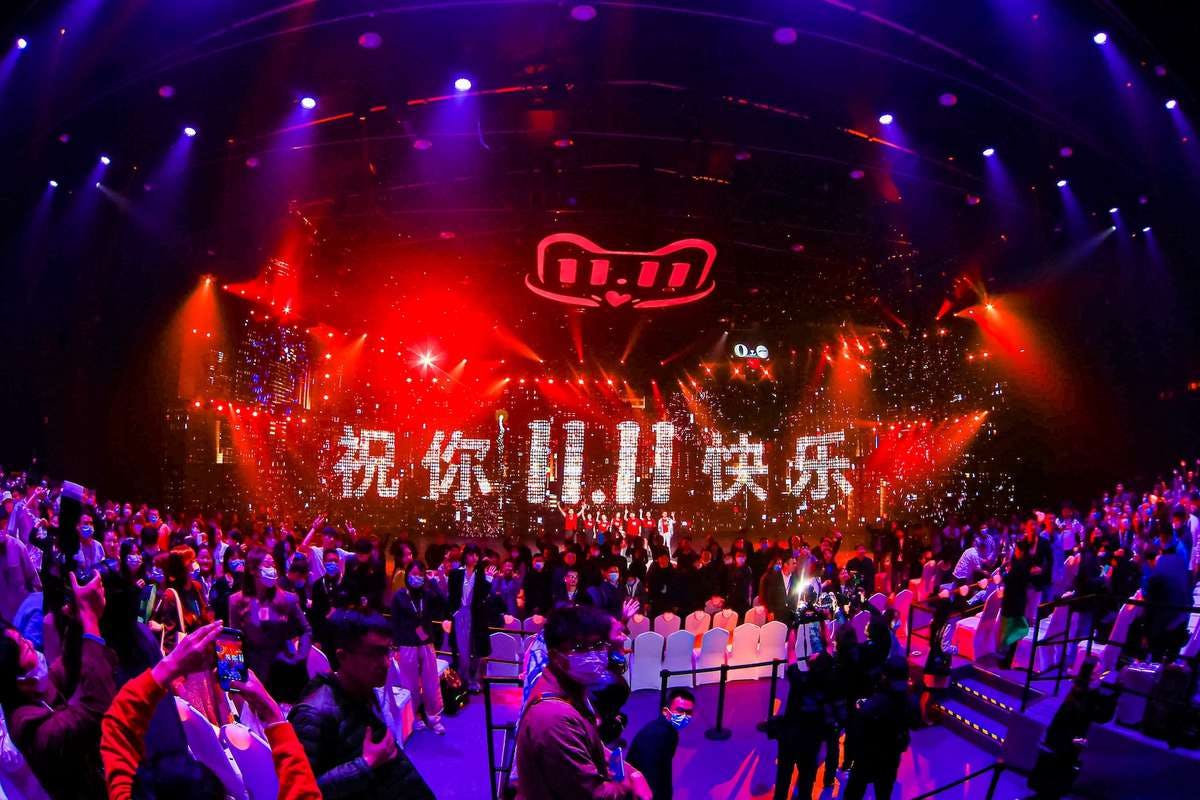China’s Singles Day, the world’s largest shopping festival, was held yesterday. The event, also known as Double 11, is China’s informal single’s Valentine’s Day. The day celebrates people who aren’t in relationships, and November 11th was chosen to represent singles, as the numbers are all single units.
Since it was first held in 2009, Alibaba Group (BEBE) ’s annual shopping festival has become a global shopping event. In the wake of China’s changing regulations, the festival took on a cautious theme. This year Alibaba stated the festival’s focus was on “sustainability and inclusiveness” rather than profits.
Record-breaking Singles Day
Since 2009, the Singles Day festival has become an opportunity for shoppers to snap up items at a bargain price. Alibaba isn’t the only shopping platform to enjoy the shopping frenzy; other e-commerce companies offer their own significant discounts and promotions. The online deals are available for days or sometimes weeks.
The festivities have also spread outside of China; Alibaba’s Southeast Asia subsidiary, Lazada, offers deals on 11.11 in Singapore, Malaysia, Indonesia, Thailand and Vietnam.
The event is an incredibly lucrative opportunity for both the platform and stocked brands; Last year, Alibaba enjoyed roughly $75 billion in total sales. Rival JD.com is said to have reached $41 billion in sales.
“This 11.11 Global Shopping Festival, we delivered steady and quality growth that is a reflection of the dynamic Chinese consumption economy. We also leveraged the power of 11.11 as a platform to fulfil our social responsibility. This year’s festival was a meaningful milestone as part of our commitment towards building a sustainable future,” said Yang Guang, Vice President at Alibaba Group.
It is no surprise that this year marks the largest 11.11 Global Shopping Festival to date, with Tmall (formally Taobao Mall) offering more than 14 million deals and a record 290,000 brands participating.
For Australian brands trying to establish themselves in the Chinese market, 11.11 is an important opportunity. The festival featured several Australian brands, and in previous years, several local brands including Swisse and BioIsland have ranked amongst the top-selling globally via cross-border e-commerce during 11.11..
Maggie Zhou, Managing Director of Alibaba Group, Australia and New Zealand, said, “This year’s festival is one of the largest opportunities for Australian businesses to reach consumers in China. With the festival now in its thirteenth year, the event will see more than 900 million consumers across China, and more than 290,000 merchants and brands join in the campaign.”
New environment
Despite the continued success of 11.11, this year’s festival had a more cautious tone. In light of the recent regulatory and market crackdown of online platforms in China, traders are framing the event as not about profits but about people.
Chinese e-commerce platforms have come under recent scrutiny. Earlier this year, Alibaba was issued a record-breaking $2.8 billion fine for behaving like a monopoly. As a result, the company has shed hundreds of billions of dollars in market value as Beijing’s reforms take shape.
Alibaba Group CMO Chris Tung recently stated, “We have been shifting our focus from pure GMV growth to sustainable growth.”
Inclusive and sustainable focus
This year’s festival saw a concerted effort by Alibaba Group to market the festival as an inclusive and sustainable event. To encourage sustainable action during this year’s Festival, Alibaba has increased the use of green technology, partnered with brands to lower carbon footprints, and utilised plastic-free, recyclable packaging.
Alibaba’s logistics arm, Cainiao Network, has also introduced package recycling across 10,000 Cainiao Post Stations in 20 cities to help reduce waste.
Ms Zhou said, “As the event becomes more mature and established, it is crucial for us to focus on building on existing value systems and giving back to the community, which is why we’ve chosen to implement a number of new initiatives to promote sustainability and inclusiveness.”
To ensure that 11.11 is inclusive to all participating, Tmall introduced “senior mode,” a new feature designed to make the user interface more accessible for senior citizens. It offers:
- voice-assisted technology
- simplified navigation
- larger font size and icons.
The app homepage now offers games for elderly users to unlock special discounts for groceries, making the experience more attractive to the “silver generation”.
Mr Tung said, “This year’s festival marks a new chapter for 11.11. We believe we must leverage the power of 11.11 to encourage sustainable development and promote inclusiveness to consumers, merchants, and partners across our ecosystem.”
Highlights from the 2021 11.11 global shopping festival
- 78 brands grew to surpass RMB100 million (AUD $21.4 million) in GMV this year, up from RMB10 million (AUD $2.14 million) in GMV last year, while 698 brands grew to surpass RMB10 million (AUD $2.14 million) this year from RMB1 million in GMV last year.
- More than 45% of consumers that made purchases were born in the ‘90s and ‘00s. Consumers born in ’00s increased by 25% year-over-year.
- 500,000 products with official Green Product Certification from more than 2,000 merchants were featured in a dedicated eco-friendly vertical on Tmall.
- Over 1,600 brands participated in the new membership challenge campaign on Tmall and attracted over 97 million new members during this Global Shopping Festival.
- More than 1.3 million new products were offered by over 29,000 overseas brands that participated via Tmall Global this year, with some 2,800 overseas brands joining for the first time.
- From November 1 to 10, 90 emerging brands remained as the top brand by GMV in their respective small categories for three consecutive years. 275 emerging brands saw their GMV doubled YoY for three consecutive years.
- Over one million packages were delivered by around 350 Xiaomanlv driverless vehicles from November 1 to 10, surpassing the volume of packages delivered by Xiaomanlv vehicles from September 2020 to September 2021.
Read more: Four trends set to reshape online shopping
Read more: Chinese cuisine on the menu for v2Food: Secures major partners in China
Keep up to date with our stories on LinkedIn, Twitter, Facebook and Instagram.

